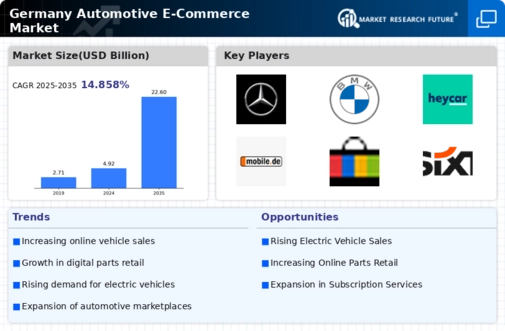Growing Demand for Electric Vehicles
The increasing demand for electric vehicles (EVs) is significantly influencing the Germany Automotive Ecommerce Market. With Germany being one of the leading markets for EV adoption in Europe, the shift towards sustainable transportation is reshaping consumer preferences. Recent statistics reveal that EV sales in Germany accounted for over 25% of total vehicle sales in 2025, reflecting a growing inclination towards eco-friendly options. This trend is prompting automotive e-commerce platforms to expand their offerings to include a wider range of electric vehicles. As consumers become more environmentally conscious, the Germany Automotive Ecommerce Market is likely to adapt by providing comprehensive information and options for EVs, thereby enhancing market competitiveness.
Rise of Digital Marketing Strategies
The adoption of innovative digital marketing strategies is emerging as a crucial driver in the Germany Automotive Ecommerce Market. Automotive companies are increasingly utilizing social media, search engine optimization, and targeted advertising to reach potential customers. Data indicates that companies employing these strategies have experienced a 30% increase in online traffic and engagement. This shift towards digital marketing not only enhances brand visibility but also allows for more personalized marketing approaches, catering to the specific needs of consumers. As automotive retailers continue to refine their digital marketing efforts, the Germany Automotive Ecommerce Market is expected to grow, driven by enhanced customer acquisition and retention strategies.
Increased Consumer Preference for Online Shopping
The Germany Automotive Ecommerce Market is experiencing a notable shift in consumer behavior, with an increasing preference for online shopping. This trend is driven by the convenience and accessibility that e-commerce platforms offer. According to recent data, approximately 60% of German consumers express a preference for purchasing vehicles online, indicating a significant market potential. The rise of digital platforms allows consumers to compare prices, read reviews, and access a wider range of vehicles from the comfort of their homes. This shift not only enhances the buying experience but also encourages automotive retailers to invest in robust online platforms to meet consumer demands. As a result, the Germany Automotive Ecommerce Market is likely to witness sustained growth as more consumers embrace the online purchasing model.
Technological Advancements in Automotive Ecommerce
The integration of advanced technologies is a pivotal driver in the Germany Automotive Ecommerce Market. Innovations such as artificial intelligence, augmented reality, and machine learning are transforming the way consumers interact with automotive e-commerce platforms. For instance, AI-driven chatbots provide personalized assistance, while augmented reality applications allow potential buyers to visualize vehicles in their own environment. Furthermore, data from the German automotive sector indicates that companies leveraging these technologies have seen a 25% increase in customer engagement. This technological evolution not only enhances user experience but also streamlines the purchasing process, making it more efficient. Consequently, the Germany Automotive Ecommerce Market is poised for growth as these technologies become more prevalent.
Regulatory Support for E-commerce in Automotive Sector
The regulatory environment in Germany is increasingly supportive of e-commerce initiatives within the automotive sector. Recent policies aimed at promoting digitalization and e-commerce have created a favorable landscape for online vehicle sales. The German government has implemented measures to streamline online transactions and enhance consumer protection, which in turn boosts consumer confidence in purchasing vehicles online. Additionally, the introduction of regulations that facilitate the sale of used vehicles through e-commerce platforms is further driving growth in the Germany Automotive Ecommerce Market. As these regulations evolve, they are likely to encourage more automotive businesses to transition to online sales models, thereby expanding the market.

























